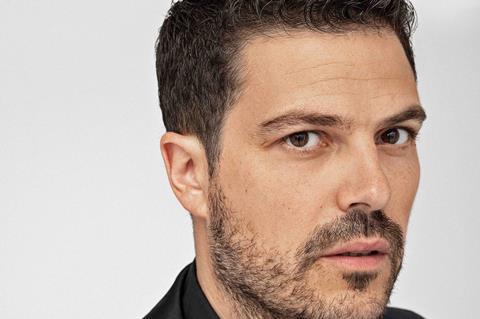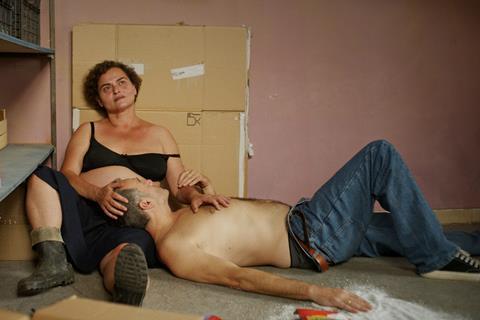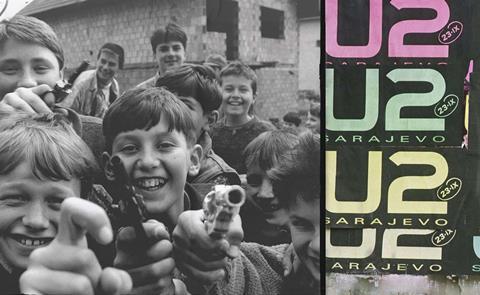
“It’s my…25th edition,” says Jovan Marjanovic, taking a moment or two to calculate just how long he has been working at the Sarajevo Film Festival, which holds its 29th edition from 11-18 August.
Marjanovic joined as a teenager, aged 19, and has held several different roles, among them programme coordinator, head of industry and co-director. Last year, he succeeded Mirsad Purivatra as sole director of the festival. “It’s basically all my professional life,” says Marjanovic, who also has a career as a producer and teacher.
He describes taking over the reins from Purivatra, who had worked at the festival since 1999, as “a choice of continuity.” The big change is that he is now the face of the festival. “You have to be present all the time at different events of the festival…and there’s the media obviously. Otherwise, it is the same team behind the festival. We are focused on the same goals. The values are the same. It hasn’t been a huge change. And it has been something I have been prepared for very well.”
Origins story
Sarajevo isn’t the most accessible festival on the circuit, but it has an enviable record in attracting big-name guests. This year, Being John Malkovich director Charlie Kaufman will be back in town to pick up a lifetime achievement award. Jessica Hausner, Mark Cousins and Lynne Ramsay are among the other leading filmmakers in attendance.
It won’t be Kaufman’s first trip to Sarajevo. The maverick American’s 2008 film Synecdoche, New York played at the festival. Ramsay may be a newcomer but most of her films have been shown at the festival. Mark Cousins first came in the mid-90s, when the Bosnian War was still raging.
“I think Sarajevo has a unique story which has been noticed from the very beginning,” says Marjanovic of why many guests are ready to make the journey to the city. They all know how the festival was founded in 1995 during the siege of the city during the Bosnian War. “From its very first edition, the festival attracted a lot of attention because it happened under the siege.”
The festival has managed to build on this unique “origins story” and all the early goodwill toward it and to grow into a key event both for industry and for the public. “This is the meeting place for Southeastern European cinema. [The producers and filmmakers] are pretty much all here during the festival,” says Marjanović, who talks of “keeping our expectations high and keeping the standards of the festival organisation high.”
Official selection
935 films were submitted to the festival this year - more than usual – with the surge likely the result of the post-Covid boom in production.
The festival has also benefited as fewer films from the region were chosen to play at other festivals this year. “We had an edition of the Cannes festival with no Romanian films,” Marjanovic says, with near disbelief. This has meant richer pickings for Sarajevo in 2023.

Half of the 10 dramatic competition titles were directed by women, including a regional premiere for Elene Naveriani’s Cannes Directors’ Fortnight title Blackbird Blackbird Blackberry. There are world premieres for Sudabeh Mortezai’s Europa, which was picked up last month by Memento International, and Greek filmmaker Christina Ioakeimidi’s Medium, a story about young love recently picked up by Wide Management for sales.
SFF has always placed as much emphasis on documentary as on dramatic features. This year, more documentaries (235) were submitted than dramatic feature films (200).
“The competitive sections give equal weight to documentary, features, narratives, shorts, student shorts,” the festival director explains of the desire to showcase the best movies from the region in whatever forms they come. “If you want to get acquainted with what is happening in the Balkans or southeast Europe, [Sarajevo] is the place where you will see most of it.”
The Bono question

The festival is opening with Kiss The Future, which tells the story of how U2 played a concert in Sarajevo at the end of the Bosnian War in 1997.
“We knew about the film for a long time. A lot of our friends are in the film. Mirsad Purivatra, our founder and long-term director and president, is one of the people speaking in the film,” notes Marjanovic.
Will Bono bring his rock star presence to Sarajevo again? [He made a surprise appearance in 2021 for a screening of Wim Wenders’ The Million Dollar Hotel]. “Anyone can show up,” Marjanovic says, with the film expected to have a very big team accompanying it.
SFF continues to lend its support to Ukraine as the war with Russia continues. As happened last year, the festival has opened up all its competition programmes to Ukrainian films and all of its industry and educational strands to Ukrainian delegates.
“We are providing a little bit of stability for them [Ukrainian film professions] in these very unstable times. They know that if they can keep working and doing their job, we are there for them.”
Reflecting on regional filmmaking
Casting his eye over films from the southeastern European region submitted to SFF, Marjanovic suggests that “budgets are there” again after the pandemic slow-down but that “we are lacking in more ambitious projects. Maybe it’s the way the film funds are organising their support teams or maybe it’s the way the co-production schemes are working; but we need a serious re-think of how we make films.”
Streamers and TV companies have been driving new work. “In Bosnia alone, we had a 400% increase in the volume of production thanks to all the series.” Renowned filmmakers like Danis Tanovic and Jasmila Zbanic (whose series I Know Your Soul was recently selected for Venice) have been turning to small-screen drama.
“That has been great but on the other hand, I think it hurt cinema a little, at least initially,” Marjanovic says of the new wave of TV dramas and series being made in the region. “In the long run, it will feed experience and new talent into films when the film funds find ways of how to be able to support more ambitious projects.”
Strike impact
Inevitably, the US writers and directors strike has had some impact. Australian star Mia Wasikowska is still head of the festival jury but won’t give a planned public masterclass, out of sympathy for the strikes.
“We cleared everything with her team and with SAG,” Marjanovic says. “But [the strike] hasn’t had a great impact. We didn’t have to cancel too much. A few films we hoped for were pushed for a later date. However, the questions the strikes are posing are on our minds and part of our conference programme obviously. I am sure they are crucial to the future of cinema.”
This year marks the 30th anniversary of Sarajevo’s legendary Cinema Apollo, the venue which continued showing films throughout the siege in the 1990s, including retrospectives from Locarno and Edinburgh. Marjanović fully acknowledges the cinema’s influence on SFF.
“This group of people, some of them still working at the festival, found themselves in impossible circumstances - under fire and under siege. They found themselves in a basement as a shelter, really. Spending their time there, trying to survive in a city under siege, they thought that how next to other things they were lacking (electricity, food, water), they were lacking the arts and culture.”
“Even under these impossible circumstances, there was a quality programme,” Marjanovic says of the work done then, that laid the foundations for the festival which continues to thrive today.

























No comments yet